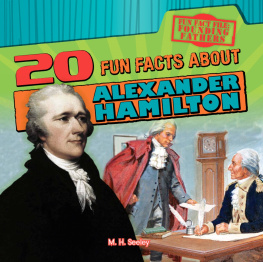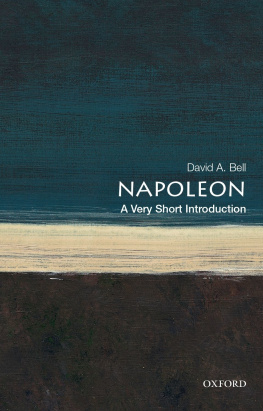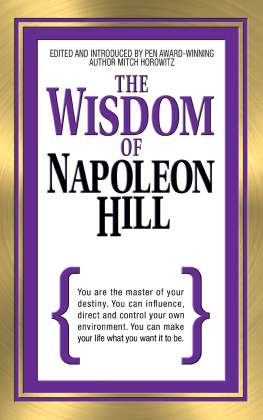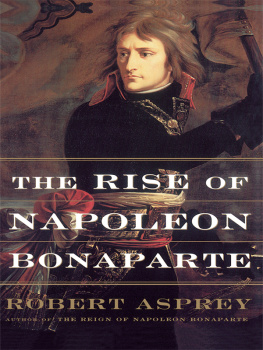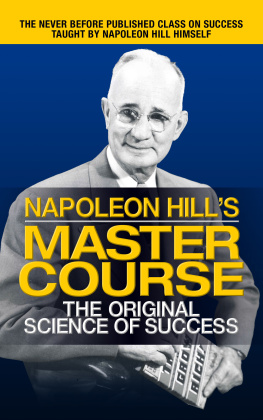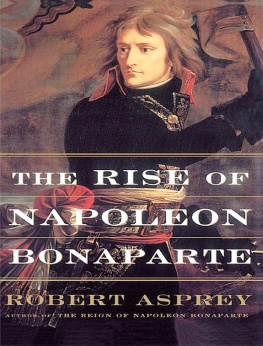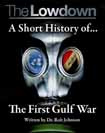This edition is published by FRIEDLAND BOOKS www.pp-publishing.com
To join our mailing list for new titles or for issues with our books friedlandbooks@gmail.com
Or on Facebook
Text originally published in 1886 under the same title.
Friedland Books 2017, all rights reserved. No part of this publication may be reproduced, stored in a retrieval system or transmitted by any means, electrical, mechanical or otherwise without the written permission of the copyright holder.
Publishers Note
Although in most cases we have retained the Authors original spelling and grammar to authentically reproduce the work of the Author and the original intent of such material, some additional notes and clarifications have been added for the modern readers benefit.
We have also made every effort to include all maps and illustrations of the original edition the limitations of formatting do not allow of including larger maps, we will upload as many of these maps as possible.
A Short History of Napoleon the First
by
John Robert Seeley
Regius Professor of Modern History in the University of Cambridge
PREFACE
To write a life of Napoleon which shall be positively short is not possible. When I undertook to write one in twelve pages of the Encyclopaedia Britannica, I thought I was attempting what was difficult; but I was mistaken; I was attempting what was impossible. I take this opportunity of acknowledging the liberality of Messrs. Black, who, in compliance with my wishes, and I believe, at considerable inconvenience to the arrangements of the Encyclopaedia, actually allowed me thirty six pages, or not less than three times the space allotted for the article. The same publishers now place me under another obligation in consenting to smooth my way to the present Short History, in which the substance of that article is incorporated.
The Life of Napoleon now given to the public is, if not absolutely short, yet, measured by the space allotted in it to each incident, almost as short as the obituary notice of a newspaper. It dismisses more than one great campaign with a sentence, more than one famous battle with a line. In the Encyclopaedia this was unavoidable, but the reader may ask whether there can be any justification for issuing as a book a summary which must needs, he may think, be as jejune as a table of contents.
I admit at once that for some purposes this Short History of Napoleon must be wholly useless, but I flatter myself that for other purposes it may well be all the more satisfactory for being so exceedingly brief. A bewilderment caused by the multitude of facts and details is the danger which chiefly besets the reader of history; and where, as in Napoleons career, facts are unusually crowded together, the danger is greatest, the bewilderment most overwhelming. I have held it possible to meet this difficulty by almost suppressing details, and thus diminishing to the utmost the demand made upon the attention and memory, but at the same time to atone for what is lost in colouring and light and shadow by clearness of outline. Nothing certainly could be more lifeless than a mere chronological catalogue of Napoleons achievements; but I thought that a narrative almost as brief as a catalogue would not be uninteresting, and still be useless, if it successfully brought together cause and effect, traced development clearly, and showed convincingly the influence of the age upon the man, and of the man upon his age.
I have therefore subordinated clearness and unity, and there are some aspects of the life which, to gain room, I have consciously omitted altogether. For instance, no attempt is made here either to describe or to estimate Napoleon as a military commander. I do not write a soldiers history of him, and accordingly, though I endeavour to give the strategical outline of each campaign correctly, the battles will be found to be not only not described, but not even narrated; they are merely registered. Again, I refrain almost entirely from drawing upon the fund of private, personal, or domestic detail and anecdote, though it is upon matter of this kind that a biography commonly depends for its vividness. The Duchess of Abrantes, Bourrienne, Mme. De Rmusat, and many more similar writers less well known, stood ready to supply such matter in no small quantity; but I wished my narrative to be clear and short, and comparatively I cared little that it should be vivid.
I thought such a plan feasible, but I did not flatter myself that it would be easy. It is particularly difficult to gain a comprehensive view of those historical persons who have an international position. Napoleon is a leading figure in the domestic history of every great Continental state, and the greatest foreign enemy in the history of England, yet most of his historians have regarded him almost exclusively form the point of view of a single state. They have written as Frenchmen, or as Englishmen, not only with limited sympathies, but actually for the most part with most imperfect knowledge.
Such an outline as I mentioned, at once short and trustworthy, could not be produced by mere compilation from ordinary authors, or by hasty investigations. I must ask the reader to believe that I have not studied Napoleons life in order to write this little book, but that I write this book because I have for years studied the Napoleonic age form many points of view, and in many countries. I need not ask him to take this entirely on credit. I have shown in my Life and Times of Stein (1879), that I have investigated thoroughly the revolutions produced by the Napoleonic wars in Germany. From my Expression of England (1883), he may satisfy himself that I have reflected on the relations of France and England in the Napoleonic age, and on the gradual growth throughout the eighteenth century of that quarrel between two nations which reached such a height under Napoleon. But since the publication of this book and during composition of this, I have pursued those inquiries further, being engaged upon a History of English Foreign Policy during the Eighteenth Century. And I draw my information at first from the manuscript despatches preserved at the Record Office. As to the French aspect of the subject, I have endeavoured here too to rest as much as possible upon documents. My chief study has lain, not in Thiers or Lanfrey, but in the Napoleonic Correspondence. I may add that my view of the connexion of Napoleon with the Revolution and of the development of the Napoleonic out of the Revolutionary age, is the result of much study of the latter as well as of the former.
Beside original documents I have of course studied the works founded on original documents which have appeared of late years. Among the recently opened sources to which this volume is indebted, I would mention particularly, on the earlier period. Jungs works; on the period of the Directory, Huffers, the later volumes of Von Sybel, and the study on the Egyptian expedition by Count Boulay de la Meurthe; on the German wars, the genuine memoirs of Hardenburg, edited by Ranke, and Rankes biography of him, Oncken on the War of Liberation, and a long list of books already used by me in the Life and Times of Stein. But some important works have appeared since that publication, especially the second volume of Oncken, and Treitschkes history; I may also mention the original researches which are now being made by A. Stern.






